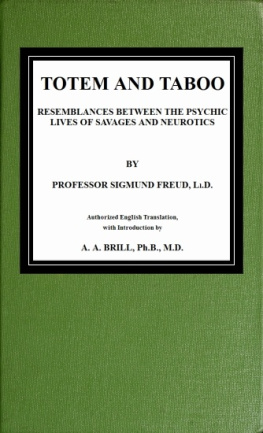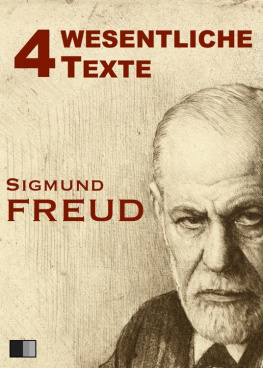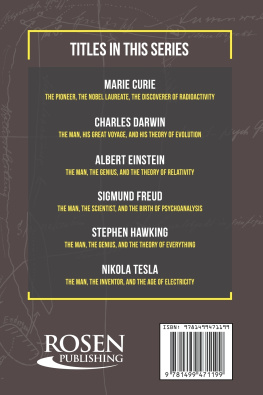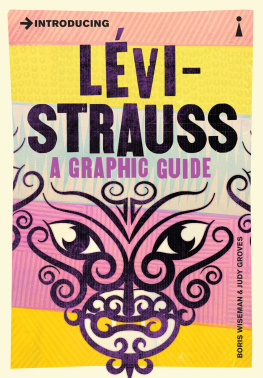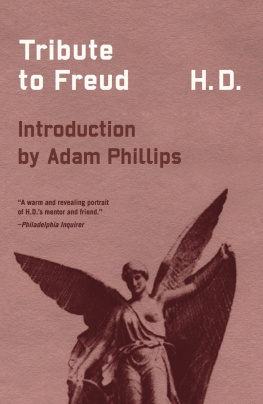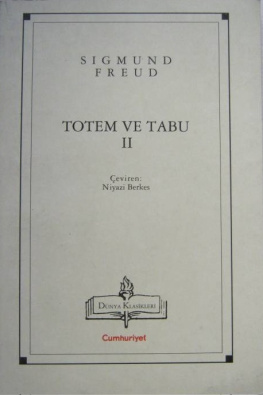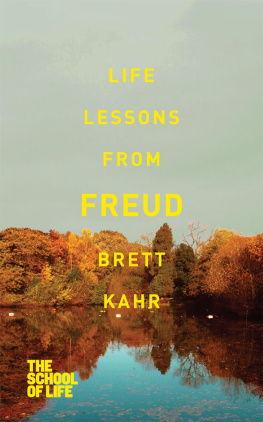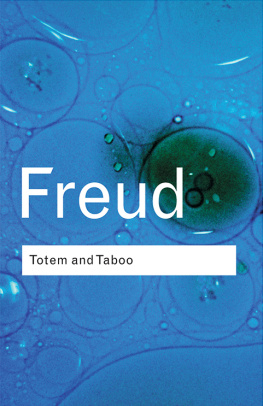The Project Gutenberg EBook of Totem and Taboo, by Sigmund Freud
This eBook is for the use of anyone anywhere at no cost and with
almost no restrictions whatsoever. You may copy it, give it away or
re-use it under the terms of the Project Gutenberg License included
with this eBook or online at www.gutenberg.org/license
Title: Totem and Taboo
Resemblances Between the Psychic Lives of Savages and Neurotics
Author: Sigmund Freud
Translator: A. A. Brill
Release Date: October 28, 2012 [EBook #41214]
Language: English
*** START OF THIS PROJECT GUTENBERG EBOOK TOTEM AND TABOO ***
Produced by Chuck Greif and the Online Distributed
Proofreading Team at http://www.pgdp.net (This book was
produced from scanned images of public domain material
from the Google Print project.)
TOTEM AND TABOO
BY DR. S. FREUD
New Books on Psycho-Analysis.
WHAT IS PSYCHO-ANALYSIS? By I. H. Coriat. 3s. 6d. net.
THE PSYCHOLOGY OF THE UNCONSCIOUS. By Dr. C. G. JUNG. 21s. net.
THE PSYCHO-ANALYTIC METHOD. By Prof. O. Pfister . 21s. net.
MANS UNCONSCIOUS CONFLICT. By Dr. W. Lay . 7s. 6d. net.
THE CHILDS UNCONSCIOUS MIND. By Dr. W. Lay . 7s. 6d. net.
MENTAL CONFLICTS AND MISCONDUCT. By W. Healy . 10s. 6d. net.
PSYCHOLOGY OF SPECIAL ABILITIES AND DISABILITIES.
By A. F. BRONNER. 10s. 6d. net.
THE NEUROTIC CONSTITUTION. By Dr. Alfred Adler .
THE PSYCHOLOGY OF THE FUTURE. By Emile Boinac .
PSYCHOLOGY OF THE NORMAL AND SUBNORMAL. By H. H. GODDARD.
Kegan Paul, Trench, Trubner & Co., Ltd. ,
London.
TOTEM AND TABOO
RESEMBLANCES BETWEEN THE PSYCHIC
LIVES OF SAVAGES AND NEUROTICS
BY
PROFESSOR SIGMUND FREUD, Ll.D.
Authorized English Translation,
with Introduction by
A. A. BRILL, Ph.B., M.D.
Asst. Prof. of Psychiatry, N.Y. Post-Graduate Medical
School; Lecturer in Psychoanalysis and Abnormal
Psychology, New York University;
former Chief of Clinic of Psychiatry,
Columbia University

LONDON
GEORGE ROUTLEDGE & SONS, LIMITED
1919
Printed in Great Britain
by Butler & Tanner.
Frome and London
AUTHORS PREFACE
THE essays treated here appeared under the subtitle of this book in the first numbers of the periodical Imago edited by me. They represent my first efforts to apply view-points and results of psychoanalysis to unexplained problems of racial psychology. In method this book contrasts with that of W. Wundt and the works of the Zurich Psychoanalytic School. The former tries to accomplish the same object through assumptions and procedures from non-analytic psychology, while the latter follow the opposite course and strive to settle problems of individual psychology by referring to material of racial psychology. I am pleased to say that the first stimulus for my own works came from these two sources.
I am fully aware of the shortcomings in these essays. I shall not touch upon those which are characteristic of first efforts at investigation. The others, however, demand a word of explanation. The four essays which are here collected will be of interest to a wide circle of educated people, but they can only be thoroughly understood and judged by those who are really acquainted with psychoanalysis as such. It is hoped that they may serve as a bond between students of ethnology, philology, folklore and of the allied sciences, and psychoanalysts; they cannot, however, supply both groups the entire requisites for such co-operation. They will not furnish the former with sufficient insight into the new psychological technique, nor will the psychoanalysts acquire through them an adequate command over the material to be elaborated. Both groups will have to content themselves with whatever attention they can stimulate here and there and with the hope that frequent meetings between them will not remain unproductive for science.
The two principal themes, totem and taboo, which give the name to this small book are not treated alike here. The problem of taboo is presented more exhaustively, and the effort to solve it is approached with perfect confidence. The investigation of totemism may be modestly expressed as: This is all that psychoanalytic study can contribute at present to the elucidation of the problem of totemism. This difference in the treatment of the two subjects is due to the fact that taboo still exists in our midst. To be sure, it is negatively conceived and directed to different contents, but according to its psychological nature, it is still nothing else than Kants Categorical Imperative, which tends to act compulsively and rejects all conscious motivations. On the other hand, totemism is a religio-social institution which is alien to our present feelings; it has long been abandoned and replaced by new forms. In the religions, morals, and customs of the civilized races of to-day it has left only slight traces, and even among those races where it is still retained, it has had to undergo great changes. The social and material progress of the history of mankind could obviously change taboo much less than totemism.
In this book the attempt is ventured to find the original meaning of totemism through its infantile traces, that is, through the indications in which it reappears in the development of our own children. The close connection between totem and taboo indicates the further paths to the hypothesis maintained here. And although this hypothesis leads to somewhat improbable conclusions, there is no reason for rejecting the possibility that it comes more or less near to the reality which is so hard to reconstruct.
CONTENTS
| CHAP. | PAGE |
| The Savages Dread of Incest |
| Taboo and the Ambivalence of Emotions |
| Animism, Magic and the Omnipotence of Thought |
| The Infantile Recurrence of Totemism |
TRANSLATORS INTRODUCTION
WHEN one reviews the history of psychoanalysis.
Faulty psychic actions, dreams and wit are products of the unconscious mental activity, and like neurotic or psychotic manifestations represent efforts at adjustment to ones environment. The slip of the tongue shows that on account of unconscious inhibitions the individual concerned is unable to express his true thoughts; the dream is a distorted or plain expression of those wishes which are prohibited in the waking states, and the witticism, owing to its veiled or indirect way of expression, enables the individual to obtain pleasure from forbidden sources. But whereas dreams, witticisms, and faulty actions give evidences of inner conflicts which the individual overcomes, the neurotic or psychotic symptom is the result of a failure and represents a morbid adjustment.
The aforementioned psychic formations are therefore nothing but manifestations of the struggle with reality, the constant effort to adjust ones primitive feelings to the demands of civilization. In spite of all later development the individual retains all his infantile psychic structures. Nothing is lost; the infantile wishes and primitive impulses can always be demonstrated in the grown-up and on occasion can be brought back to the surface. In his dreams the normal person is constantly reviving his childhood, and the neurotic or psychotic individual merges back into a sort of psychic infantilism through his morbid productions. The unconscious mental activity which is made up of repressed infantile material for ever tries to express itself. Whenever the individual finds it impossible to dominate the difficulties of the world of reality there is a regression to the infantile, and psychic disturbances ensue which are conceived as peculiar thoughts and acts. Thus the civilized adult is the result of his childhood or the sum total of his early impressions; psychoanalysis thus confirms the old saying: The child is father to the man.

